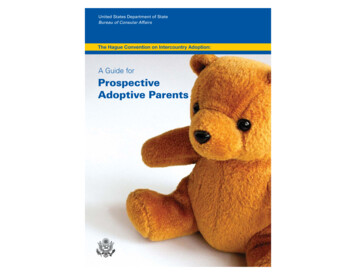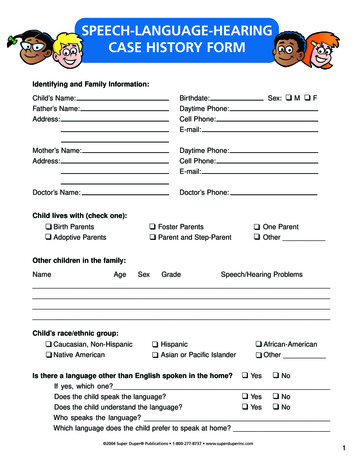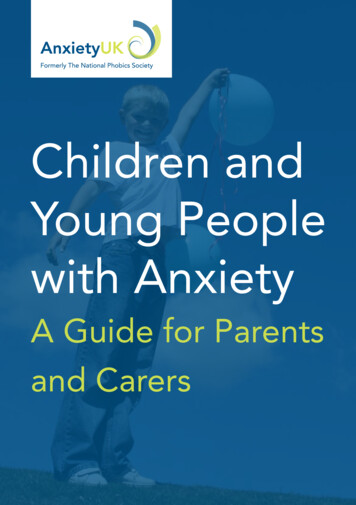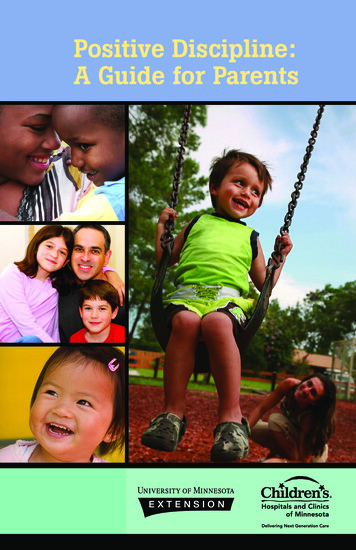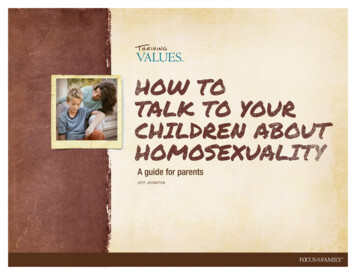
Transcription
A guide for parentsJEFF JOHNSTON
PRESCHOOL—AGES 2-52Framing the Issue2What to Teach And Talk About3A Firm Foundation4Real-Life Scenario4Possible Responses5A Word of Caution5ELEMENTARY—AGES 6-126Framing the Issue6Other Important Ideasto Communicate7Real-Life Scenario7Possible Responses7Real-Life Scenario8Possible Responses8A Word of Caution10MIDDLE SCHOOL &BEYOND—AGES 13 & UP10Framing the Issue10What to Teach And Discuss12Real-Life Scenario12Possible Responses12Real-Life Scenario13Possible Responses13Reliable Resources15PLEASE NOTE:This resource provides ideas and guidance forparents who are having conversations abouthomosexuality with children as they encounter thetopic in the culture. It does not provide informationor advice about helping children or teens who“come out” and identify as gay or bisexual;question their sexual identity; or struggle withgender confusion.PRESCHOOL—AGES 2-5Framing the Issue:A Four-Part StoryTeach your children a simple, four-part storyof our world: God made a good world;For assistance1 and resources for seriousconcerns such as these, Focus on the Family offersa one-time complimentary consultation from aChristian perspective. To reach our counselingdepartment by phone, call 1-855-771-HELP(4357) weekdays 6:00 a.m. to 8:00 p.m. (MountainTime). Please be prepared to leave your contactinformation for a counselor or chaplain to return acall to you as soon as possible. The consultationis available at no cost to you. You may also reachus online by filling out our Counseling RequestForm2 or you can visit FocusontheFamily.com/FindaCounselor.3In addition, “Family Help”4 at Focus on theFamily5 has resource lists and answers tofrequently asked questions about a wide rangeof issues.How to Talk to Your Children About Homosexuality People did not obey God and sinned; God forgives, saves and transforms those whofollow Jesus Christ; and, He will gloriously remake both this world andthose who trust Him.When children take in and process new information,they start from what they already know, connectingnew information to their previous knowledge.So, before your children are even aware ofhomosexuality, begin by giving them a biblicalview of the world.As you do so, you frame the issue by teachingthem about God and His redemptive plan forfallen people, providing your children with a basicunderstanding of our world. We want to startfirst with what’s good when talking about difficultsubjects, so begin by teaching about God’s plan2
for us. This lays a solid foundation foryour children.COMPLIMENTARYRESOURCESFind a children’s Bible or Biblestorybook and read it with yourchild. This biblical frameworkprovides the starting place fordiscussing difficult issues.Parents: Teach biblical truth aboutmarriage to your children with theseThriving Values resources. Help yourchildren stand strong in challengingtimes with creative ideas and practicalsuggestions.What To Teach AndTalk AboutDOWNLOAD YOUR FREECOPIES TODAY!“Raising Children WhoHonor Marriage”6Product & Distribution ID: FOF-PDF-80-00002“How To Teach YourChildren AboutMarriage”7THE FALL Adam and Eve disobeyed God and sinned.They did not trust God and did what He toldthem not to do, eating from the Tree of theKnowledge of Good and Evil. Adam and Eve’s disobedience had badconsequences, as sin and death enteredthe world.CREATION People do wrong things, even moms anddads, and we all need God to forgive us andhelp us do what’s right. God made the Earth and all that’sin it; He is the source of all life. When we do something wrong, we admit itand ask those we’ve hurt to forgive us, too. God made people in His imageand loves us very much. Remindyour children, “You are deeplyloved by God.”REDEMPTION God had a plan to bring salvation to the worlddespite our disobedience, promising to Evethat a Savior would come. God separated humanity into maleand female. Both boys and girls(and men and women) are good,but different. This thread of salvation and redemption iswoven throughout the Old Testament, as Godmakes promises to Noah, Abraham, Isaac,Jacob, Moses and all of Israel. Children come from a mother and father; Godintended parents to love, care for, protect,teach and guide children as they grow. Jesus Christ fulfilled all these promises, livinga perfect life, dying for us, coming back to life,and rising up to heaven. God gives us good gifts, like friendship,marriage and family. The good news is that Jesus’ life, death, burialand resurrection bring salvation and freedomfrom sin!Product & Distribution ID: FOF-PDF-80-00007How to Talk to Your Children About Homosexuality3
When we choose to put our confidence inJesus and follow Him, we are born into God’sfamily. God gives His children the Holy Spiritto guide and transform us in a fallen world. God helps us treat all people with kindness,even those who sin against us, who aredifferent from us or with whom we disagree.GLORIFICATION Scripture portrays our future unionwith Christ as a wedding feast,a celebration. Just as marriage unites a bride andher husband, Christians will oneday be united with Jesus Christ. Those who follow Jesus will bewith Him forever in a new Heavenand Earth. The Bible tells us that Heaven willhave no pain, sin or sadness. We have a future and a sure hopebecause God has made thesepromises to those who follow Him.How to Talk to Your Children About HomosexualityA Firm Foundation:Begin Teaching God’sDesign For MarriageUse simple Bible stories, such as the Creationstory, to show how God made Adam and Eve foreach other and created the first marriage. Youmight use the story of Noah to show the animals,male and female, going into the ark. Even youngchildren can understand that a “mommy” animaland a “daddy” animal together have a baby animal.Point out examples from life to teach thesetruths. Explain, for example, that Mom and Dad aremarried—marriage is a good gift from God. Whena child sees something bad, remind them that sinbrought pain into the world. When your childrenstart noticing that boys and girls are different, teachabout God separating humanity into male andfemale. Life is full of such teachable moments!Real-Life ScenarioYour family is traveling and visits a new city. It’sJune, when schools break for summer vacation.As you enjoy the sights, you begin to noticerainbow flags, T-shirts and displays, and yourfamily sees some same-sex couples holding hands.You’ve stumbled into a gay pride celebration.4
Then your young child suddenly asks, “Why arethose two men holding hands? Why are those twowomen kissing?”Possible ResponsesThese depend on the age of the child, his or herlevel of concern about this scene and his or herverbal and abstract ability: “God planned marriage to be between ahusband and wife. But sin came into the worldand causes all of us to do wrong things. Onewrong thing some grownups do is changeGod’s plan for marriage so that two men ortwo women can marry.” “Not everyone follows God’s plan formarriage, so sometimes two women will actlike they are married. But they can’t really bea husband and wife because they are bothwomen. Sin has confused them; they needGod’s help to follow Him.” “God made marriage to bebetween a man and a woman.But not everyone obeys God andfollows His plan. So sometimes twomen will decide to marry. But webelieve that marriage is between ahusband and wife.”How to Talk to Your Children About HomosexualityA Word of CautionAt this age, children don’t need informationabout specific sexual activity; they’re notequipped to handle adult sexuality. Furthermore,we suggest waiting until kids are older beforeintroducing terms such as “homosexuality,”“heterosexuality,” “gay,” “straight,” or “LGBT.”Boys may be confused if you say, “Those menare gay; that’s when two guys love each other.”At this age, boys are typically relating to andidentifying with other boys. So a boy might think tohimself, “I’m a boy, and I like boys. Does that meanI’m gay?” Some children have come home fromschool lessons on homosexuality and asked thisvery question.The same would absolutely apply to girls. Wesuggest you avoid such statements as, “Beinghomosexual or lesbian is when two girlslike each other.” This takes what is a normal,healthy developmental stage—girls liking andconnecting with each other—and equates it withhomosexuality. Young girls should attach with andlove their mother and other women and girls as theydevelop their growing feminine identity.5
ELEMENTARY—AGES 6-12RELIABLE RESOURCESAs children in this age group grow in theirgeneral awareness of sex and sexuality, weoffer select resources, designed to helpas you engage in conversations with yourchildren on these issues.and Guidancefrom Focus onthe Familyt— Basic Goalsity Educationentand Family TherapisLicensed Marriage Parenting and Youth DepartmKeeton, M.MFT,- Edited by theby Geremy F.sking DepartmentFamily Counseliby Marcin PiwowarIllustrationsHealthy SexualFocus on theOur online series, “Talking aboutSex and Puberty,”9 and our freeresource, “The Talk: HealthySexuality Education—Basic Goalsand Guidance from Focus on theFamily,”10 give helpful guidance asyou address these sensitive topics.Framing the Issue:Marital Love isDifferent fromOther LovesMarriage between a man and womanis different from other relationships.God has given humanity a numberof good gifts, including marriage,love, friendship and family. Beginwith God’s good intentions for humanrelationships before discussingproblems and sin.Borrowing on C.S. Lewis’ ideas fromThe Four Loves,8 this would be agood age to explain to your childrenthat there are different types of love: Our “love” (or liking, really) for food, thingsand activities. Love for Creation, including our care foranimals and the environment. Friendship and love for our friends. Love for family including parents’ love forchildren; children’s love for mom and dad;How to Talk to Your Children About Homosexualitybrothers’ and sisters’ love for each other; lovefor other relatives. Marital love, which includes romantic orprivate (sexual) love, the love between ahusband and a wife. God’s love for us and our responsive loveto Him.Children can compare and contrast these typesof love. You could discuss the different types ofresponsibilities and activities associated with thesedifferent levels of love and relationship. Dependingon the age of your child, you might also discussways that sin damages and destroys love.Marital love has purposes and characteristicsthat are distinct from other loves. As appropriate,talk to your children about these marital traits,including: Permanence: Friendships may change, butmarriage should last a lifetime. One Man/One Woman (monogamous): Wemay have lots of friends, children and familymembers, but only one husband or wife. Male And Female: God separated humanityinto male and female; marriage brings thoseback together.6
Oneness: Marriage unites a couple in aspecial way; that’s why sexual expression isintended only between a husband and wife.Intimacy, pleasure and joy are a significantpart of the marital union. Familial: Marriage between a man and awoman often brings forth new life—children. Societal: Children do best when raised bytheir married mother and father. Parents raisethe next generation, so a married mom anddad raising healthy children benefits all society. Symbolic: In the Bible, marriage is theprimary picture of our relationship with God. Glorifying God: Following God’s intentionsfor marriage brings glory to Him.If the issue of homosexuality comes up, you canthen explain that it is one distortion of God’s designfor human love. Two men who “marry” are missingsomething—the femininity of a woman. A childraised by two women is deprived of a father. Twomoms can’t be a dad.Other Important IdeasTo Communicate Your children need to hear from you directlythat they may safely talk to you about difficultissues. Don’t assume: Ask questions, listenwell and encourage them to speak freely.How to Talk to Your Children About Homosexuality They’re also watching to see that you love andrespect others, speaking truth courageouslyand gracefully. People are worthy of respect. As followers ofJesus Christ, we don’t bully other people oruse demeaning terms or expressions. You’re now expanding their knowledge ofmale and female differences, why thesematter and how marriage brings the twohalves of humanity together. Not everyone has a Christian worldview, butwe love and respect them anyway.Real-Life ScenarioYou’re in the kitchen on New Year’s Day, makingbreakfast and watching the Rose Parade, a familytradition. Your syrup-faced children are staringat the screen when a float goes by with two menholding hands while a pastor performs theirwedding ceremony. Your children turn to look atyou for a response.Possible ResponsesThese responses depend on the ages of yourchildren, their level of concern and their verbaland abstract ability:7
“We’ve talked about how Godmade marriage to be between aman and a woman. That’s whatthe Bible teaches. But becauseof Adam’s sin, the world is not asit was meant to be. Some men,because of sin in the world, wantto marry other men. Some peopleagree with them, and even changeGod’s design for marriage to allowtwo men to marry.” “You know how we’ve talkedabout different kinds of love,like friendship and marriage?Most people grow up and marrysomeone of the opposite sex.Because of sin in the world, somepeople get off-track. Sometimesmen and women want to marrysomeone like themselves ratherthan the opposite sex.” “Marriage brings together a husband andwife—that’s God’s intention. But this world isnot perfect, and not everyone follows God’sdesign. Some people have changed marriagein our country so two men or two women canmarry each other. The Bible says that’s notgood. Why don’t we pray right now for thesemen to come to Jesus and follow God’s planfor their lives?”How to Talk to Your Children About HomosexualityReal-Life ScenarioYour sixth-grade daughter comes home fromschool. She is very quiet and seems upset. You askwhat’s going on, and finally she blurts out, “Well,I was talking to Olivia at recess and some girlscalled us ‘lezzies.’ What’s a ‘lezzie?’” (Olivia is yourdaughter’s best friend.)Possible Responses First, stay calm, keep cool and pray forwisdom. Then, ask your daughter questions,such as, “What do you think that wordmeans? How did you feel when those girlscalled you names?” After she has a chance todescribe her thoughts and feelings, you mightgive a simple explanation, such as, “That wordis used to attack and belittle people. It’s shortfor ‘lesbian,’ which means a woman who hasromantic attractions toward other women.” “Your friendship with Olivia is good. It waswrong of those girls to bully you and Oliviaand call you names. Most girls your age haveother friends who are girls, and sometimesthey even have a ‘best friend.’ That’s reallygood and healthy. You and Olivia are preciousand valuable to God.” “Words can really hurt, can’t they? Did youknow that Jesus was called all kinds ofnames, too? He knows how you feel and8
wants to comfort you. Let’s pray right now totake those words off you and place them onthe cross. Then, Mom and Dad will bless youby praying good words over you.” “I’m so sorry that happenedto you and your friend. Momand Dad want to protect youas much as possible, so we’llbe talking to the school11about working to keepstudents from hurting otherkids with mean words.” “Because people are made in God’simage and are very precious, it’s wrongfor anyone to call people mean names orbully another person. When we are hurt,it’s important to pray until we can forgivethe person who hurt us. Forgiving someonedoesn’t mean that you don’t hold themaccountable or try to stop them from hurtingyou again, but that you release them fromyour judgment. When you’re ready, let’s talkmore and pray about forgiving those girls.”Sadly, our hyper-sexualized culture is ready tosteal innocence from children. And the rapid risein the visibility of homosexuality makes it all tooeasy for some to cast a shadow on the goodnessand necessity of same-sex friendships. Same-sexHow to Talk to Your Children About Homosexualityfriendships are a vital part of growing up. It’s anintegral part of the developmental process wheregirls identify and connect with other girls, andwhere boys connect and compete with other boys.Your children may hear or seehomosexuality-related words fromneighbors, classmates, televisionor social media. If you hear themusing inappropriate language,this would be the time to explainthat God loves all people andthey are worthy of being treatedkindly, so we don’t use unkind words. Words arepowerful and can hurt people.Ask your kids questions, “Where did you hearthat word? What do you think it means?” Then, youmight have a short, frank discussion about God’sdesign for healthy relationships and marriage. Youcan explain that those words describe things thatgo against God’s design.Some older children, especially those whounderstand human reproduction, may ask aboutthe sexual activity of homosexual men and women.Answering this question is up to your discretion,but we suggest reminding children that when ahusband and wife unite sexually, they form a singlereproductive unit. Their bodies are designed to fit9
together naturally. Same-sex couples can neverform a reproductive whole. You might tactfullyand carefully tell them that homosexual activity isfundamentally different from a marital union.A Word of CautionAs with younger children, wesuggest being careful how youexplain things. Saying, “Beinggay is when two guys like eachother,” is confusing to boys whoare strengthening their internalsense of masculinity. Part of thisinvolves distancing themselvesfrom girls and identifying with andrelating to other boys and men.The same would apply togirls. We suggest you avoidsuch statements as, “Beinghomosexual or lesbian is whentwo girls like each other.” Thistakes what is a normal, healthy developmentalstage—girls liking and connecting with each otheror following older girls as role models—and equatesit with homosexuality.MIDDLE SCHOOL &BEYOND—AGES 13 & UPFraming The IssueDiscuss deeper questions of life with adolescentsand teens: “Who am I and why am I here? Do I havea purpose which God will help me discover? Or is itup to me to create my own meaning for life?”If your kids are at this life stage and you haven’talready taught them the big picture frameworkssuggested previously in this resource, it’s never toolate! The four-part story of humanity, different typesof love and the unique characteristics of marriageare topics you can still discuss with older children.Middle school students and older should know andunderstand these basic truths.But teenagers are also able to deal with moreabstract concepts. So as part of setting theframework for talking about homosexuality, itwould be helpful to talk to your children abouttwo competing worldviews that attempt to definewho we are, why we are here and where we deriveour answers to those questions.The first worldview comes from the Bible andhistoric Judeo-Christian teaching: God designedus and created us for a purpose—to love andHow to Talk to Your Children About Homosexuality10
know Him, to love and know others, and to dogood work in this world. We have intrinsic valueand meaning that comes from being created inGod’s image and likeness. The good work that wedo includes creating and nurturing families.God gives us many gifts—creativity, reason, family,relationships, sexuality, feelings, language andmore. As we grow and connect with God andothers, we grow in these gifts and in our discoveryof who we are. We have meaning and purpose,which we discover and fulfill with God’s help.Our bodies have purposes, too, and when ahusband and wife unite sexually, they form acomplete reproductive system. Their union has thecapacity to bring forth new life. Homosexual unionslack this significant capability.Scripture also teaches that Godgives us the ability to makechoices. But our freedom tomake choices has been damagedand distorted by sin. Sin causesus to want to do wrong. Andultimately, freedom is lost assin takes control. We becomeenslaved by sin and can lose our ability to chooseto do good instead of bad. We are separated fromGod and unable to grow into all we were createdto be. The good news is that Jesus openedthe kingdom of God to all. Because of His life,How to Talk to Your Children About Homosexualitydeath, burial and resurrection, we can become Hischildren, be free from sin and discover our purpose.In the Jewish and Christian view, marriage betweena man and a woman is a gift from God, with familyflowing from the joining together of a husband andwife. Most societies recognize the good of marriagebetween a man and woman and set marriage apartas the best place for sexual expression and creatingfamily. Family is the basic building block of society,nurturing and educating the next generation.On the flip side, the secular worldview says, “Thereis no God,” and “The only real meaning I havein life is what I choose. I don’t have a purpose orultimate end; I can be whatever I want.” In this view,we define ourselves, and many people end updefining themselves by their sexual attractions oractions.In this worldview, there is no larger purposeand nothing is sacred—not sexuality, marriage,family or children. So marriage can be redefinedto be something that it’s never been before: twomen or two women. Likewise, sexual relationshipshave few or no limits.In this non-biblical, human-centered view, sexualactivity is separated from marriage and procreation,and even from being a male-female union.It becomes more about seeking pleasure orself-fulfillment.11
What To Teach And Discuss God created you to know and love Him, toknow and love others and to do good workwith Him in this world.Uncle Mike has come out to the family as gay andis bringing his same-sex spouse to the upcomingfamily get-together. Identity, meaning and purpose come frombeing created and redeemed by God, frombeing in His family.Possible Responses Marriage and family have God-ordainedmeaning, value and purpose—far greaterthan the arbitrary and changing definitionsassigned by society or individuals.Your Thoughts:Real-Life Scenario We treat all people with kindness,love and respect. We live in a world with competingworldviews; the Christian worldviewis in direct conflict with thedominant, secular worldview thatrules much of culture. The world is increasinglyantagonistic toward Christians andGod’s design for sex and sexuality.Our children need to be preparedto be bold and courageous,speaking the truth in love.How to Talk to Your Children About HomosexualityThese depend on the ages of your children,their level of concern and their understanding ofrelationships and sexuality: “Uncle Mike now identifies as gay; he isromantically attracted to other men andembraces this as his identity. He is bringinghis partner to our next family gathering. TheU.S. Supreme Court redefined marriage in2015, and he and his partner were married ina ceremony last month. We still believe Goddesigned marriage and sexual love to bebetween a husband and wife. Even though wedon’t agree with Uncle Mike and his partner,we will treat them with kindness and respect.Please come and talk to me or mom if youhave any questions.” “You know God made us male and femalein His image, and the Bible explains thatGod gave us marriage between man and awoman as a good gift. Well, not everyonefollows God’s plan. Uncle Mike just told us heidentifies as gay, and he wants to follow thosefeelings in his life. He is now married to a man12
and will be bringing his partner to the nextfamily get together. We love Uncle Mike andpray he’ll return to following God’s design formarriage and sexuality.” “We don’t believe that Uncle Mike was borngay or that God made him homosexual.And we don’t know all the factors that haveinfluenced him in that direction. We aregoing to love him and his partner, and we’llpray for them. We disagree with hisdecisions, but that doesn’t meanwe love him any less. It’s hard whensomeone you care about moves in adirection contrary to God’s plan.”WHAT DOES THEBIBLE SAY ABOUTHOMOSEXUALITY?In this short book, Sam Allberrygives clear, concise answers12to questions about the Bibleand same-sex attractions.Joe Dallas respondswith truth13 to those whomisinterpret what Scripturesays about homosexuality.See these – and other usefulresources – at Focus on theFamily’s online store.FIND MORE!14Real-Life ScenarioYour teenage daughter has agood friend, Bradley, who hasjust confided in her that he thinkshe’s gay. She’s come to you withquestions and is looking for adviceand support.Possible ResponsesYour daughter needs to know thatyou are safe to talk to, and thatyou love and care for her. She alsoneeds to know: She can’t carry thisissue alone; it is not her responsibilityto rescue Bradley; you will help herHow to Talk to Your Children About Homosexualityset healthy parameters on her relationships; andyou care for her friend and his well-being.We believe the family is foundational for individualhealth, growth and security. However, whileparents should be the safest people to talkwith about sexual struggles, this is not alwaysthe case. So while we believe, at some point, thisyoung man will need to talk with his parents abouthis homosexual struggles, we don’t suggest yourush out and tell them—or anyone else.Your role in his disclosure depends on yourrelationship with Bradley and his family. Not allparents handle this situation well. You shouldascertain first, by discussing with him, whether hishome situation is one of safety and security. If youare able to, talk with him about how he thinks hisparents will respond and about resources and helpthat are available if they don’t respond well.Depending on your family and Bradley’s, youmight reach out to involve him in some of yourfamily activities, such as dinners, movie nightsor game nights. Dad, especially, should take theinitiative in connecting with Bradley. It’s not goodfor your daughter’s relationship with him to developseparate from and outside of your family. It’sfairly common for guys who struggle with samesex attractions to connect emotionally with girlswhen they also need to build healthy, non-sexualrelationships with other boys and men.13
Here are some ideas for talking with your daughter: “How can we best help you in this situation?What kind of love and support do you needfrom us right now? How are you doing withwhat Bradley shared?”COUNTERING CULTURALCONFUSIONFor older children who ask challengingquestions about homosexuality, we’veposted an article with short answersto some frequently asked questions:“Countering the CulturalConfusion: Your QuestionsAnswered About Homosexuality.”15This resource also has thoughtprovoking discussion questions andlinks to other helpful articles, websitesand books for continued conversation.READ NOW! “You know that we believe Godmade us male and female in Hisimage, and designed marriagefor a husband and wife. We alsoknow that sexual struggles impacta person deeply. How can wecommunicate truth and love toBradley in a helpful way?” “Sweetie, we’re so glad Bradleyfelt safe to talk to you aboutthese difficult issues. That’s aheavy burden for him to carry.We are praying for God to movein Bradley’s life so he will knowGod’s love and follow Jesus. If hewants it, there is good Christiancounseling that can help himunderstand his attractions andrespond to them in a biblical way.Can we pray together for Bradley?” “It’s important that Bradley’s parents know, atsome point, about the issues he’s strugglingwith. If we can help by meeting with him andtalking, we’re willing to do that. We could helphim think through what he wants from hisHow to Talk to Your Children About Homosexualityfamily and how he thinks they might respond.We’d also be willing to be there when he talksto his family. Please let him know we arewilling to do that.”As your family relates to Bradley, and as he isopen to you, it would be good to communicate: You love him no matter what. Love doesn’t mean you agree with everychoice he might make in response to havingsame-sex attractions. His primary identity is as a man created inGod’s image, and if he is a believer, he is achild of God, a follower of Christ. “Being gay”isn’t his core self. It’s important to have non-sexual relationshipswith other Christian guys. Some research16 shows teens that identify as gaydon’t always have the same identity later in life. He can follow God’s design for sexuality,in spite of same-sex attractions.Some teens may ask about the sexual behaviorof homosexual-identified men and women. Ofcourse, answering this question is up to yourdiscretion, but we suggest not going into a lot ofdetail. Keep it short and simple, but honest.Remind your kids that when a husband and wifeunite sexually, they form a single reproductive unit;14
their bodies were made to fit together naturally.Same-sex couples can never form a reproductivewhole. Homosexual activity is fundamentallydifferent from a marital union.something like, “That’s a really good question. Areyou open to hearing other answers? May I findsome resources with a different viewpoint, and let’slook at your article and mine together?”Reliable ResourcesWe want your biblical values—and those of yourchildren—to thrive in today’s culture.Middle and high school students are very techsavvy—connected to both friends and the Internet.Often they’re exposed to viewpoints that mightbe contrary to Christianity and their parents’values. So they may challenge you with questionsor statements:RELIABLE RESOURCESFocus on the Family has additionalresources—including articles,books, websites and downloadablecontent—for understanding andteaching your children aboutmarriage
and Guidance from Focus on the Family,”10 give helpful guidance as you address these sensitive topics. Healthy Sexuality Education — Basic Goals and Guidance from Focus on the Family outh Department b, Licensed Marriage



